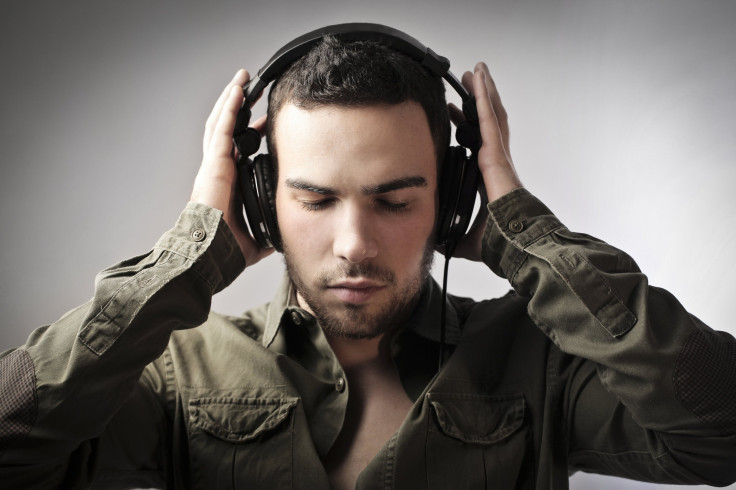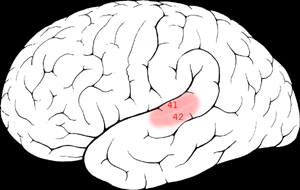This Is Your Brain On Music: How Our Brains Process Melodies That Pull On Our Heartstrings

You’re lying on your back in bed with a pair of headphones on, listening to a new album by one of your favorite artists. While you listen, you feel unexplained emotions brimming; it’s as if you’re transcending reality.
The brain’s ability to absorb and make sense of music — what some scientists refer to as organized sound — is highly complex and far more effective than even a computer’s capacity to identify and process it. But questions about how exactly the brain takes in organized sound still remain: Why does it make us feel the way we do?
Everyone likes different types of music: Some people may feel more uplifted when they listen to classical music, while others don’t get the same high when listening to Bach or Beethoven. However, research has shown that despite personal preferences, music in general has a synchronized effect on people’s brains.
“Despite our idiosyncrasies in listening, the brain experiences music in a very consistent fashion across subjects,” Daniel Abrams, an author of the study and a postdoctoral researcher at Stanford University School of Medicine, told CNN. Participants in the study, who had no formal musical training, listened to four symphonies by William Boyce, while undergoing an fMRI brain scan. The researchers found that among all the participants, the music had an almost identical effect in their brains; it activated brain regions that are involved in movement, planning, attention, and memory — which means that when we listen to music, we aren’t just simply processing sound, like background noise or the sound of a car engine. Music is more meaningful to our brains than just any sound: It's repetitive, melodious, organized.

Daniel Levitin, a psychologist who studies neuroscience and music at McGill University, believes that because music can activate these areas in the brain in everyone, no matter your musical preferences, music is unifying. “It’s not our natural tendency to thrust ourselves into a crowd of 20,000 people, but for a Muse concert or a Radiohead concert we’ll do it,” Levitin told CNN. “There’s this unifying force that comes from the music, and we don’t get that from other things.” In his book This Is Your Brain On Music, Levitin argues that evolutionarily speaking, music led to social bonding and improved fitness.
Other researchers believe music was important to human evolution in various ways, from providing babies with a playful way to learn language, to aiding the memorization of knowledge or history (passing down information to other generations), or even helping to stay awake around a bonfire while on watch for predators.
And because we like repetition, our brains are constantly predicting what will happen next based on a pattern like the beat of a song. This is how we end up tapping our toes or dancing.
But even though music can be unifying, and its effects are quite similar on everyone’s brains, why do some people prefer Nirvana over Tchaikovsky? This is where music becomes linked to emotions, a gray area of research that has intrigued the neurologist Oliver Sacks. In his research, depicted in the video blow, Sacks used himself as an example of how different types of music activate the brain at varying intensities. Sacks, who has loved the composer Bach since he was 5 years old, allowed his brain to be scanned while listening to a new, obscure Bach piece as well as a Beethoven piece. He tracked how the music made him feel — his welling of emotions — with a handheld device that allowed him to rate his emotions on a scale. After the test, Sacks said the Bach piece was beautiful for him, but Beethoven “left him flat.” Amazingly, the brain scans correlated with Sacks’ emotions: His brain was far more aroused during the Bach piece than the Beethoven piece.
Music, the Drug?
Music conjures pleasure and is often associated with enjoyable activities like partying, socializing, mating, and relaxing. Several studies have linked music to drug-like effects.
Research conducted by neuroscientist Valorie Salimpoor found that music releases dopamine, the “feel good hormone” that is activated from pleasurable experiences like food or sex. “Music, an abstract stimulus, can arouse feelings of euphoria and craving,” the authors wrote, “similar to tangible rewards that involve the striatal dopaminergic system.” They found that dopamine release was at “peak emotional arousal” during music listening.
Listening to music changes your brain chemistry, Levitin says. “And we know that people use music the way they use drugs,” he told NPR. “You come home at the end of the day, you reach for some music that will relax you, puts you in a good mood. ... What one person calls heavy metal another person might call soothing classic rock. But when you’ve got the music dialed in that you like, it will put you in a good mood, put you in a bad mood, propel you.”
The Benefits of Music
The complex changes that occur in our brains when we hear our favorite song are interesting — but there must certainly some tangible benefits to listening to music, right? Music has plenty of benefits, but one of them — contrary to popular belief — may not be making you smarter, despite all those CDs out there targeting parents who want to make their kids brilliant by playing Mozart at an early age.
In a TED talk, cognitive neuroscientist Jessica Grahn gently debunks the hype surrounding the “Mozart makes your babies smarter” marketing train, which all stemmed from one study. Music itself doesn’t make your brain sharper, but rather, how it makes you feel is what's important. The feelings music conjures can actually improve your performance on cognitive tasks, Grahn explains. She describes several studies where both adults and children listened to classical music or enjoyable familiar songs and then completed tasks. Their performance was improved after listening to music — classical or not — that made them more aroused and made them feel better, based on personal preferences.
This ability of music then to make us feel good brings with it its own benefits. Grahn says that music can reduce pain or help people recover from stroke or other injuries, and it can also improve our cognitive skills. For those of us who plug into our iPods while working out, music can sometimes even improve endurance. Several studies have also shown that music can improve dementia symptoms.
“So music may not be the shortcut to producing brainiacs or mini Einsteins, but it does have powerful effects on our minds and bodies,” Jessica Grahn said in the TED Talk. “And scientists like myself are always excited to carry on investigating music so we can find other ways to tap into its potential.”



























